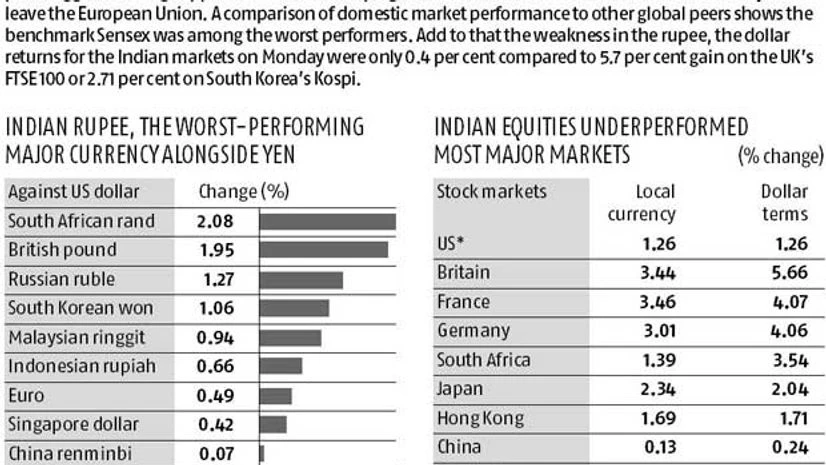The Indian markets escaped unscathed from the news of Raghuram Rajan's surprise exit from the post of central bank head after concerns over Britain's exit (Brexit) from the European Union (EU) eased and the government unleashed a slew of FDI (foreign direct investment) reforms.
The benchmark Sensex ended at 26,867, 241 points or 0.9 per cent higher, despite dropping 0.7 per cent in intra-day trade. The NSE (National Stock Exchange) Nifty 50 gained 68 points or 0.84 per cent, to close at 8,238. The rupee fell 0.35 per cent to 67.31 compared to the previous close of 67.08. The rupee had fallen to month's low of 67.66 against the greenback but managed to pare losses after state-owned banks sold dollars, said market players. Yield of 10-year benchmark government security climbed to 7.53 per cent but ended at 7.49 per cent compared to the previous close of 7.50 per cent.
Experts were expecting a more adverse reaction after central bank head Rajan on Saturday, in a surprise move, announced that he won't opt for a second term when his term ends on September 4.

The domestic markets managed to shrug off initial weakness as global markets were up sharply as opinion polls showed campaign to leave EU was losing momentum. European markets were up over three per cent, while most Asian markets posted robust gains as well. US futures trading pointed to a strong opening on the Wall Street. Meanwhile, most currencies gained against the dollar and safe havens such as gold retreated.
"Markets could get over the Rajan impact quickly as Brexit worries have eased," said Andrew Holland, chief executive, Ambit Investment Advisors. "Everyone wanted Rajan to continue as he did a good job, but his exit can't be a big negative in my view. We have never had a bad central bank head. They are always highly regarded."
Most brokerages said the markets would keenly watch the announcement on Rajan's successor and his views on various policies.
Meanwhile, stocks were also buoyed by the government's decision to open up sectors like defence and aviation for FDI. Shares of airline companies and those operating in the defence sector rallied sharply.
"Markets were bolstered by the expectations of a positive outcome from the Brexit poll and FDI relaxations in several sectors. Advance of monsoon has also helped," said Dipen Shah, head, private client group research, Kotak Securities.

Interestingly, most of the buying support on Monday was provided by domestic investors. Going by provisional data provided by exchanges, foreign institutional investors (FIIs) were net sellers of Rs 537 crore. Meanwhile, domestic institutional investors, such as LIC (Life Insurance Corporation), were net buyers of Rs 724 crore.
Major Sensex gainers included Tata Motors, Tata Steel, Bharti Airtel, and Infosys. Technology, telecom, and automobiles were the best performing sector indices.
Analysts said developments around Brexit would be a key driver for the markets this week. In the event of an exit of Britain from EU, the financial markets could witness turbulence, they said.
FOREIGN BROKERAGES LAMENT RAJAN EXIT
Most brokerages were surprised by RBI (Reserve Bank of India) governor Raghuram Rajan’s decision to not opt for a second term after his current tenure ends in September. Most believe Rajan’s exit (Rexit) has implications for domestic markets. Excerpts of what foreign brokerages said on Rexit:
CLSA
Undoubtedly, Rajan has played a big role in building India’s credibility among the international investment community and his exit would disappoint many investors. However, we do not believe this is an end of the "India story". The immediate near-term impact is negative for rupee and equity markets, especially in the context of the upcoming Brexit worries and US dollar outflow worries as NRI (non-resident Indian) deposits mature.
Citi
We expect the markets to wait for more clarity on the new governor’s name and more importantly his views on continuity versus change. If the new governor is able to strike a right balance between the two, he will gain credibility and the market focus is likely to shift back to improved macro fundamentals.
Bank of Amercia Merrill Lynch
Markets typically move on if the successor proves himself, as is mostly the case. We continue to expect a final 25-basis-point cut on August 9, assuming the Met (meteorological office)'s forecast of 106 per cent of normal monsoon. We expect the RBI intervention to smooth out any rupee volatility. In the case of Brexit later this week, it would likely allow any dollar strength to play out.
Credit Suisse
The governor’s unexpected departure is negative for the currency as it raises uncertainty over the new monetary policy framework, managing potential volatility around events like NRI deposit withdrawals in September-November.
Nomura
This is a negative surprise as markets (and we) were expecting him to continue. Rajan added credibility to the RBI and there is no obvious successor of a similar stature. There is also a risk of some delay in reforms such as formation of a monetary policy committee, bank restructuring, and allowing repo transactions in the corporate bond markets. Although the news is negative in the near term, we do not expect a lasting medium-term impact.

)
